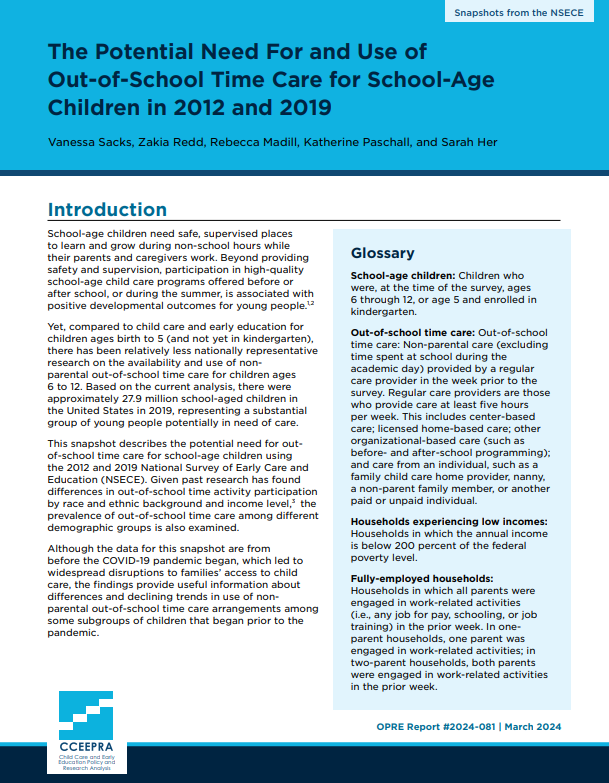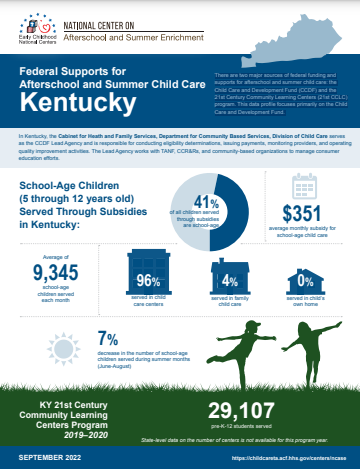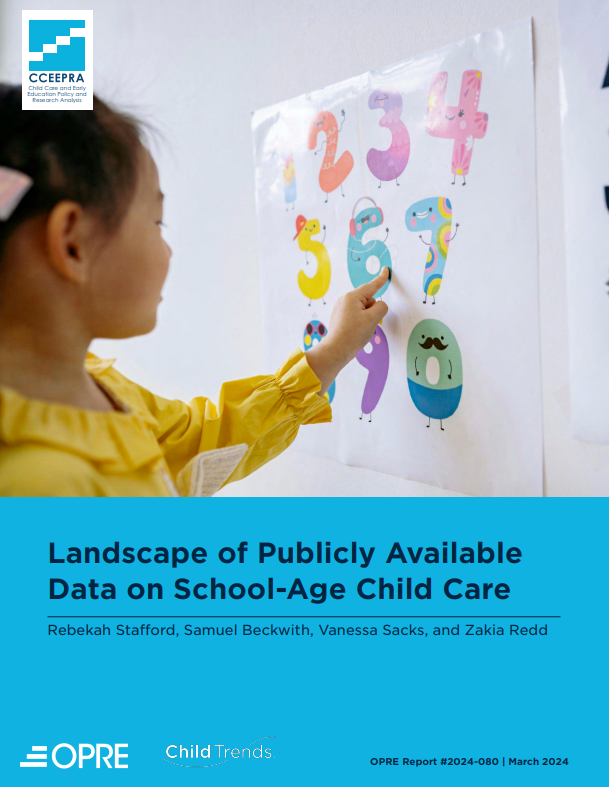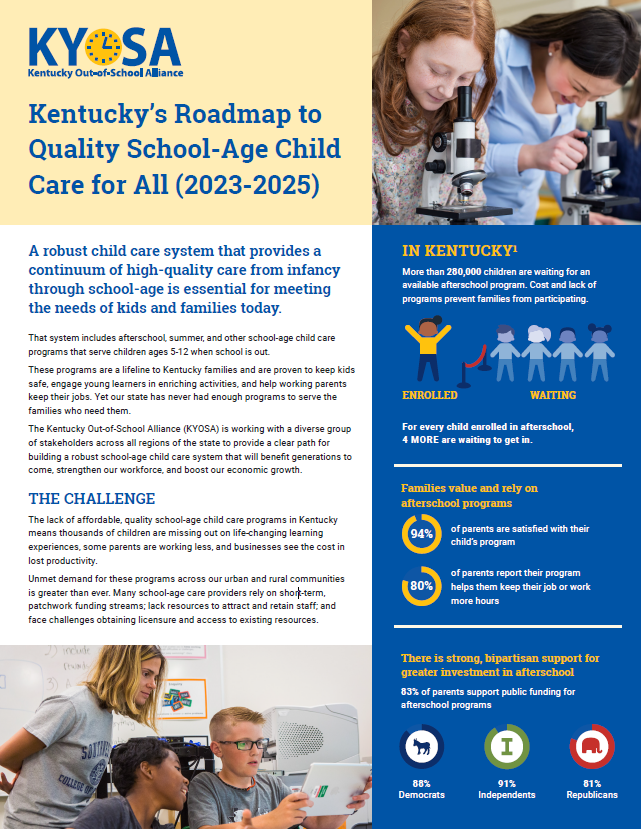A robust child care system that provides a continuum of high-quality care from infancy through school-age is essential for meeting the needs of kids and families today. That system includes afterschool, summer, and other school-age child care programs that serve children ages 5-12 when school is out.
School-Age Child Care Overview
Watch this video from our partners at the National Center on Afterschool and Summer Enrichment (NCASE) to learn why school-age child care is so important for Kentucky’s youth and families!
Learn More

The Potential Need for and Use of Out-of-School Time Care for School-Age Children in 2012 and 2019
This snapshot from Child Trends describes the potential need for OST care for school-age children using the 2012 and 2019 National Survey of Early Care and Education (NSECE). The prevalence of out-of-school time care among different demographic groups is also examined.

Federal Supports for Afterschool and Summer Child Care: Kentucky
This latest state school-age data profile from the National Center on Afterschool and Summer Enrichment (NCASE) includes state-level data on the number of school-age children in Kentucky served through CCDF and what CCDF policies and best practices are used in Kentucky to support school-age child care access and quality.

Landscape of Publicly Available Data on School-Age Child Care
This landscape analysis from Child Trends finds that despite the high need for SACC, there is limited publicly available data on SACC-related topics, such as parent/family preferences, cost, availability, and the types of care used. The analysis highlights what publicly available data sources currently exist and where further investment in SACC-related data collection is needed.

Cost and lack of programs limit participation.
The lack of affordable, quality school-age child care programs in Kentucky means thousands of children are missing out on life-changing learning experiences, some parents are working less, and businesses see the cost in lost productivity. For every child in Kentucky enrolled in an afterschool program, 4 MORE are waiting to get in. The KYOSA Data Explorer is an interactive mapping tool that shows which communities currently have limited or no access to these programs.
Kentucky families value and rely on afterschool programs.
- 94% of Kentucky parents are satisfied with their child’s program.
- 80% of Kentucky parents report their program helps them keep their job.
There is strong, bipartisan support for greater investment in afterschool.
83% of Kentucky parents support public funding for afterschool programs.
- Republicans: 81%
- Democrats: 88%
- Independents: 91%
2023-2025 Policy Priorities
Much work is needed to ensure that every Kentucky community has access to high-quality school-age child care programs that meet the needs of young people and working families. This set of legislative and administrative priorities provides a roadmap for how we’ll do it.
Click the “+,” located on the top right-hand corner of each box, to view recommended actions. Progress updates are highlighted in red.
Recommended Actions:
- Expand the Child Care Advisory Council’s (CCAC’s) membership to ensure equitable representation, capacity, and resource sharing across all types of child care in Kentucky, especially school-age care.
- A KYOSA staff member now attends and presents updates at all CCAC meetings to ensure school-age needs are being shared and considered. Any formal change to the Council’s required list of members would require a statute revision.
- Ensure that the needs of school-age providers and the families they serve are meaningfully addressed and incorporated in future Child Care Development Fund (CCDF) State Plans.
- The deadline for states to submit a final draft of their 2025-2027 CCDF State Plan is June 30, 2024. KYOSA is currently working closely with the Lead Agency (the Kentucky Division of Child Care) to ensure school-age needs are meaningfully addressed in the draft.
Recommended Actions:
- Establish an Administrative Regulations Review Committee (ARRC) to ensure state child care licensing standards, youth camp regulations, and exemptions are clear, reasonable, and appropriate for Kentucky’s diverse landscape of school-age programs and the children they serve.
- This is a top priority for KYOSA during the current Regular Session of the Kentucky General Assembly.
- Ensure the final administrative regulations associated with HB 499, which establishes the Employee Child Care Assistance Partnership program, support families’ child care needs through school-age.
- KYOSA is closely following the current Regular Session of the Kentucky General Assembly to monitor if this program will be funded past the initial pilot year and provide feedback on how to ensure equitable access for families seeking to use ECCAP assistance for school-age care.
Recommended Actions:
- Update Kentucky All STARS to include evidence-based school-age quality metrics under each domain.
- The Kentucky Division of Child Care (DCC) is currently discussing a possible review and update to Kentucky All STARS within the next 1-2 years. KYOSA and the School-Age Child Care (SACC) Advisory Council stand ready to be a thought partner on this work.
- Train licensors to work in school-age environments and to understand what safe, quality school-age environments look like.
- Invest in partnerships that enable the Lead Agency to offer relevant and ongoing training and technical assistance (TTA) to school-age providers and staff.
- KYOSA continues to work with DCC to increase the supply of relevant school-age training and professional development opportunities that are approved for credit in ECE-TRIS.
KYOSA stands ready to be a thought partner on school-age quality measurement, training and technical assistance (TTA), and professional development supports.
Recommended Actions:
- Finalize and adopt the proposed School-Age Youth Development credential.
- The Kentucky SAYD Credential was adopted by the legislature and launched in January 2024. KYOSA and members of the SACC Advisory submitted letters of public comment on the draft administrative regulations during the open-comment period, but many systemic barriers remain that will prevent school-age staff from completing the required training hours. Future regulatory and statute revisions are needed to ensure equitable access to this credential for professionals exclusively working with school-age youth.
- Ensure wage increases and benefits made possible to front-line school-age program staff through federal COVID-relief funding can be sustained past impending funding cliffs by creating a dedicated source of state funding for afterschool and summer programs serving K-12 students.
- Revise the Kentucky Career Lattice to include relevant pathways for school-age professionals at each level.
Recommended Actions:
- Require all child care license exemptions to be verified by and recorded with the Kentucky Division of Regulated Child Care through a formal application process.
- KYOSA has discussed this issue with DCC and provided examples from other states of how this could be done without placing an undue administrative burden on the state.
- Update Kentucky’s current public child care search tool to align with “best practices,” which include integrating both licensed and license-exempt programs into such tools.
- The current public child care search tool does not include license-exempt providers, even though this is recommended by the federal Office of Child Care. Also, many of the search filters, such as the ability to search for only school-age programs, do not appear to be working as they should. KYOSA continues to bring this to DCC’s attention, as families rely on this tool to effectively locate child care in their area that will meet their needs.
- Ensure state child care data systems allow key data points, such as the number of children a provider serves, to be summarized by age group.
- KYOSA continues to make recommendations to DCC on how to address current data gaps. KYOSA and DCC are hopeful that the new opportunity for providers to receive Brightwheel Child Care Management Software 100% free from DCC will allow the state to compile more accurate data on school-age supply and enrollment data.
Note: The above priorities were developed by the Kentucky Out-of-School Alliance (KYOSA) based on feedback from KYOSA’s School-Age Child Care (SACC) Advisory Council, a diverse group of school-age child care stakeholders representing nearly 30 organizations and agencies across all regions of Kentucky. If you are interested in joining the SACC Advisory Council, click the button below and complete the interest form at the bottom of the page.
Council Members
Appalachian Early Childhood Network
Ashland Area YMCA Child Care
Barren County Family YMCA
Buckner Elementary Bear Care
Burns Elementary Afterschool Program
Cairo Child Care
Centerfield Wildcats Cub Club for Children
Child Care Aware of KY
Creatively Invented, LLC
Daviess County Public Schools
Hopkins County Family YMCA
Jessamine County Schools Afterschool & Summer Camp Programs
Johnson County Schools
Kentucky Division of Child Care
Kentucky Environmental Education Council
KSU Promising Youth Center for Excellence
KY Alliance of Boys & Girls Clubs
Learning Grove
Mayfield/Graves County YMCA
Our Angels Child Care Center
Paris/Bourbon County YMCA
Partners for Rural Impact
R.C. Durr YMCA
Somerset School-Age Child Care Program
St. John Afterschool Adventures Kids Club
Tamarack Afterschool Program
AlphaBest
YMCA of Greater Louisville
Youth Enrichment Program – Buckner Bear Care

